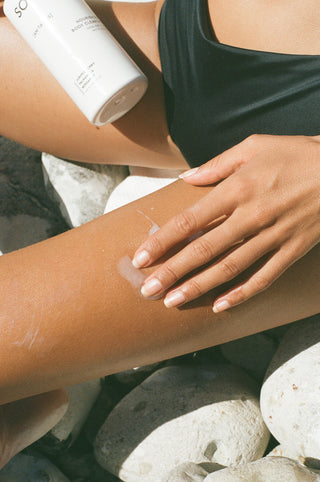Your skin is not just an outer layer; it is also a living ecosystem. Just like a dense rainforest, your skin contains a diverse community of microorganisms known as the skin microbiome. This is not science fiction, but pure biology that is deeply rooted in our existence. Not only does the skin microbiome protect us from harmful microbes, it also contributes to our immune response and even influences the condition of our skin, because it is a finely tuned balance. In this article we explain what exactly the skin microbiome is, why it is so crucial to our health and wellbeing, and how we can promote it through a smart and thoughtful approach to hygiene.
The Skin Microbiome: The protector we can't see
Many bacteria, fungi and viruses live together invisibly on our skin in what is called the skin microbiome. Microorganisms not only help form a protective barrier against harmful invaders, but also actively support our skin health and immune response. It has been scientifically proven that a healthy and balanced skin microbiome is essential for the skin's natural defenses. It supports the integrity of the skin barrier and is crucial in preventing conditions such as eczema, psoriasis and even acne by helping to fight against pathogenic microbes (biological pathogens). These microorganisms are also involved in normal physiological processes of the skin, such as regulating pH levels and supporting natural skin cell renewal.
Cleansing too often or using aggressive chemical products can disrupt this delicate ecosystem and lead to an imbalance in the skin's natural balance. Such disturbances can cause a variety of skin problems, from dryness and irritation to more serious conditions. That's why it's essential to take a balanced approach to skin care and hygiene, respecting and supporting the skin's natural ecosystem.
Balance in hygiene: Health and skin microbiome protection.
While it is essential to maintain the skin's natural ecosystem, in the context of public health we cannot ignore how crucial regular hand hygiene is. The Centers for Disease Control and Prevention (CDC) points out that hand hygiene is one of the most important methods of preventing infections from spreading. Washing your hands regularly and effectively can significantly reduce the spread of pathogens such as viruses and bacteria that cause colds, flu and gastrointestinal tract infections. A study published in the American Journal of Public Health (Aiello AE, et al. Effect of hand hygiene on infectious disease risk in the community setting: The effectiveness of hand hygiene in reducing the incidence of gastrointestinal and respiratory infections is confirmed by a 2008 meta-analysis. The authors conclude that regular hand hygiene, including the use of hand disinfectants, can contribute significantly to public health by preventing the spread of infectious diseases.
Some artificial preservatives such as parabens, formaldehyde donors and phenoxyethanol in skin care products can be harmful to the skin microbiome. For example, parabens are associated with hormonal disruptions and can disrupt the natural balance of the skin microbiota. It is possible that formaldehyde-releasing agents and phenoxyethanol cause skin sensitivity and irritation, which in turn affects the skin microbiome. Substances such as triclosan and phthalates, which have antimicrobial properties or are used in plastics, can also disrupt the skin microbiome.
Effect of Alcohol and Natural Soaps on the Skin Microbiome
Even when it comes from natural sources, alcohol has a powerful antibacterial effect. If used too much, it can also damage the beneficial bacteria on the skin and dry out your skin. It can effectively kill pathogens, but when used excessively, natural soaps can still strip the skin's natural oils, leading to dryness and possible disruption of the skin microbiome, despite often having a milder effect than synthetic soaps.
Although overuse can disrupt the skin microbiome, alcohol and natural soaps are often considered milder options compared to strong antibacterial agents like triclosan or harsh synthetic chemicals. This is because they can effectively remove pathogens without the harsh side effects of certain synthetic substances.
The key to maintaining a healthy skin microbiome while effectively cleaning hands lies in the balanced use of these products. This means avoiding excessive washing and cleansing and choosing products with moisturizing and soothing ingredients that help nourish the skin and maintain its natural barrier.
Natural Cleansing and Care with SOAPSTAR
SOAPSTAR opts for a harmonious balance between cleaning and care with a range of natural soaps and cleansing sprays. These products are carefully formulated with ingredients from nature, such as essential oils and inulin, which not only effectively remove dirt and pathogens, but also respect the natural structure and health of the skin.
For example, using inulin, a prebiotic, supports the skin microbiome by feeding beneficial bacteria. The essential oils in SOAPSTAR's products also play a crucial role, not only by providing natural fragrances, but also through their restorative and antimicrobial properties. These oils have been carefully selected for their natural ability to support the skin microbiome and contribute to overall skin health. They help repair and protect the skin from harmful microbes without disrupting beneficial bacteria. SOAPSTAR's products show that effective hygiene can go hand in hand with respect for the skin and its delicate microbiome.

